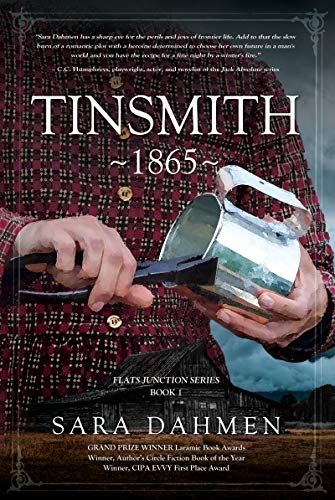
Sara Dahmen’s historical fiction, Tinsmith 1865, is a skillfully written account of tin and coppersmiths in the years following the Civil War. But more than that, it’s a story of a woman who doesn’t fit into the expected mold of that era.
Marie Kotiarczyk, 18, together with her recently widowed father and two brothers, travel by wagon train from Chicago to Flats Town, Dakota Territory. The Polish immigrant family are tinsmiths. Although Marie is fascinated by their occupation, her place is doing woman’s work. Unfortunately, she is not a good cook, nor does she have interest in any phase of womanly duties. What fascinates Marie is her family’s occupation.
They arrive in Flats Town to a shop her father has previously arranged to rent, a shop that will double as their home. Marie assumes her expected duties, but occasionally tinkers in the family profession. When her brothers join the Army to fight the Indian wars, Marie and her father are devastated. Marie steps in to help with the family business, fulfilling her deep-harbored dream, but also fearing not only failure, but breaking expectations of what a woman should do. When her father is stricken with illness, she must take over to fill the orders.
Marie has many worries. Will the townspeople take her occupation seriously? Her skills are in demand—will she be able to produce a worthy product? Will the cups she produces leak? Will the kitchen utensils she creates be things of beauty? When the Army places a large order, Marie is under pressure to show what she is capable of doing. She must succeed to pay their many debts.
I loved this book. The author portrays complex characters rich with desires and dedication to work. Her characters have scarred and calloused hands with grime under their fingernails; their clothes have holes due to sparks from creating their product. They’re not beautiful people, yet they’re appealing. I particularly appreciated learning about the tin and coppersmith profession. The author speaks with authority on that subject as she works as a metalsmith of vintage and modern cookware of tin, copper and iron.
Tinsmith 1865 is Book 1 of the “Flats Junction Series,” and is also currently in production to become a major motion picture. I’m looking forward to more of this series and to seeing it played out on screen.


I ordered mine and it’s in my Kindle.
I think you’ll really like this book, Irene. I sure learned a lot about tinsmithing. I attended her workshop, too, at last year’s conference in San Antonio, something like books to movies.
I recently finished The Tinsmith and loved it. A few modern remarks bothered me in the early chapters. Thaddeus when he was angry and walking out on the meal, said “shove it!” I don’t think that was used in the early 1800s.
More than once she used “pushed back” when arguing in conversation, pushed back in their words, not physically. That phrase is fairly new (to me) and tremendously popular right now.
Otherwise, it was a great story and overall I truly enjoyed it.
Those are good observations, Irene. As writers, we become more alert to those kinds of occurrences, don’t we? Thanks for your comments.
Mary,
I read this book. Sarah is an amazing writer. I learned so much about tinsmithing in the novel and it read so beautifully. Fabulous read!
I learned a lot, too, Carmen. Also, I attended a workshop of Sara’s at last year’s WWW conference.